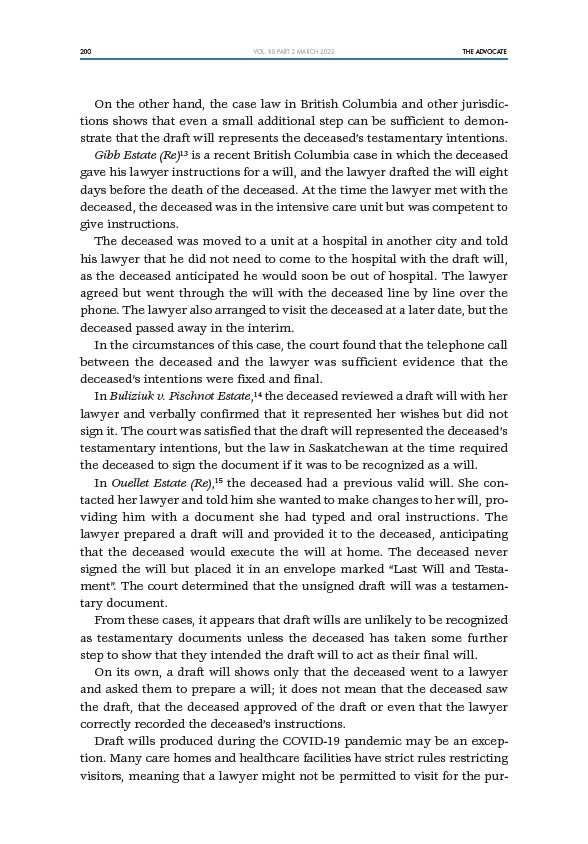
200 THE ADVOCATE
VOL. 80 PART 2 MARCH 2022
On the other hand, the case law in British Columbia and other jurisdictions
shows that even a small additional step can be sufficient to demonstrate
that the draft will represents the deceased’s testamentary intentions.
Gibb Estate (Re)13 is a recent British Columbia case in which the deceased
gave his lawyer instructions for a will, and the lawyer drafted the will eight
days before the death of the deceased. At the time the lawyer met with the
deceased, the deceased was in the intensive care unit but was competent to
give instructions.
The deceased was moved to a unit at a hospital in another city and told
his lawyer that he did not need to come to the hospital with the draft will,
as the deceased anticipated he would soon be out of hospital. The lawyer
agreed but went through the will with the deceased line by line over the
phone. The lawyer also arranged to visit the deceased at a later date, but the
deceased passed away in the interim.
In the circumstances of this case, the court found that the telephone call
between the deceased and the lawyer was sufficient evidence that the
deceased’s intentions were fixed and final.
In Buliziuk v. Pischnot Estate,14 the deceased reviewed a draft will with her
lawyer and verbally confirmed that it represented her wishes but did not
sign it. The court was satisfied that the draft will represented the deceased’s
testamentary intentions, but the law in Saskatchewan at the time required
the deceased to sign the document if it was to be recognized as a will.
In Ouellet Estate (Re),15 the deceased had a previous valid will. She contacted
her lawyer and told him she wanted to make changes to her will, providing
him with a document she had typed and oral instructions. The
lawyer prepared a draft will and provided it to the deceased, anticipating
that the deceased would execute the will at home. The deceased never
signed the will but placed it in an envelope marked “Last Will and Testament”.
The court determined that the unsigned draft will was a testamentary
document.
From these cases, it appears that draft wills are unlikely to be recognized
as testamentary documents unless the deceased has taken some further
step to show that they intended the draft will to act as their final will.
On its own, a draft will shows only that the deceased went to a lawyer
and asked them to prepare a will; it does not mean that the deceased saw
the draft, that the deceased approved of the draft or even that the lawyer
correctly recorded the deceased’s instructions.
Draft wills produced during the COVID-19 pandemic may be an exception.
Many care homes and healthcare facilities have strict rules restricting
visitors, meaning that a lawyer might not be permitted to visit for the pur-